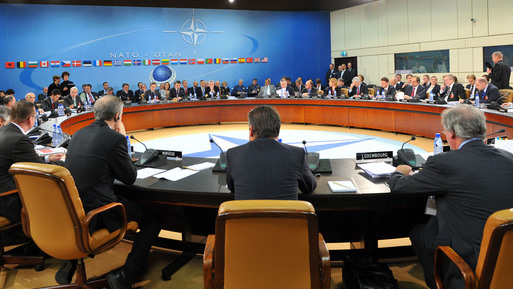
From Ian Traynor and Julian Borger, the Guardian: Nato agreed to take over the air campaign against ground targets in Libya, putting the alliance in command of all operations and supplanting the coalition of the US, France and Britain that has attacked Muammar Gaddafi’s forces for the past week.
The 28 ambassadors of Nato’s policy-making North Atlantic council met in Brussels to agree the rules of engagement for the air campaign aimed at protecting civilians against Gaddafi’s onslaught, with Turkey and Germany keen to narrow the scope of the operations and France bristling at any constraints on its more gung-ho approach.
The decision means that Nato will take charge of all three aspects of the Libya campaign – enforcing a no-fly zone and arms embargo as well as prosecuting the air campaign on ground targets. The decision, capping a week of squabbling over Nato’s role, came in advance of a conference in Londonon Tuesday bringing together more than 40 foreign ministers and international organisations aimed at plotting Libya’s future. …
Amid persistent French attempts to belittle Nato’s role and make the alliance military machine subservient to a smaller core political leadership of a "coalition of the willing", senior Nato diplomats said the alliance takeover would be undiluted. "There’s a clear understanding that the totality of the operation is handed to Nato," said a senior diplomat in Brussels. "No more, no less. When Nato takes over, the coalition is over."
Political and military control of the operations would rest with Nato plus other contributors to the campaign from Arab and African countries.
Another senior Nato source said France could yet cause problems. If Paris considered the rules of engagement agreed as too timid, it could reserve the right to continue to unilateral operations outside Nato’s chain of command. The senior diplomat ruled that out, saying it would require a fresh UN mandate. …
There is also to be a parallel meeting of a smaller group to provide oversight for the campaign. Disagreement persisted yesterday among the allies over whether this group should include only those actively contributing to the campaign, as France prefers, or whether it should involve all Nato members plus Arab allies. The Foreign Office said the smaller meeting would include "all those who have already contributed to the military enforcement of UN security council 1973 and those who are considering doing so".
The French position is politically divisive as it would exclude Nato members such as Turkey and Germany who are not contributing ships or planes. Senior German sources said Berlin could do a U-turn and send ships to help police the arms embargo in the Mediterranean. (photo: NATO)
Image: nato%204%2019%2010aa.jpg
